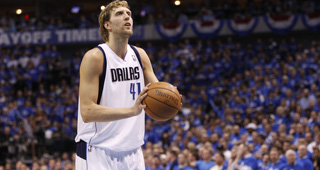The Dallas Mavericks produced a run through the Western Conference that proved to be both surprising and informative. By taking out the reigning champs and a feisty Oklahoma City Thunder squad, the team showed their mettle and versatility. One of the things that makes Dallas dangerous this postseason in particular has been their depth both in the starting lineup and coming from the bench. Compared to most NBA teams, especially their NBA Finals opponent, Dallas has a ton of options on the offensive and defensive ends- other than possibly the Lakers, no team has as many rotation-quality players as the Mavericks.
Even with all that talent, Dallas’ offense builds on the back of Dirk Nowitzki. His performance in the playoffs has shown us that Nowitzki may even be better than he was the last time the Mavs made a run like this because he understands how to balance his offensive game in order to keep defenders on edge. The Nowitzki we’re seeing now likely would not have succumbed to defense like Stephen Jackson’s when Dallas was shocked by the Golden State Warriors in 2007. This spring, teams have focused on stopping Nowitzki and have had little success either on that goal or on the big goal of the scoreboard.
However, Dallas’ biggest strengths also provide one of their biggest weaknesses. While the Mavericks carry a loaded arsenal of players, Nowitzki is the only one who can reliably create for himself as well as for others on the entire team. While players like Shawn Marion and Jason Kidd still can play and have had those roles earlier in their careers, that time has passed both of them by. The exact thing that makes Dallas great is that each of their secondary players can make you pay for leaving them open feeds off of teams using the common basketball religion that is the attempt to shut down the opponent’s best player.
What Miami should do is the exact opposite: The Dirk Rules. Instead of putting more pressure on Nowitzki using a second man, the Heat should focus on making everyone else a limited and largely ineffective player.
There are two primary reasons for employing this strategy:
- Without the space to make moves, the secondary talent on Dallas will have major problems with scoring and creating for others- Without Caron Butler to keep defenses on their toes, the Mavericks have to use heavy doses of Jason Kidd, Jason Terry, and JJ Barea on the perimeter. Each of those players can do an excellent job when given space, largely on rotations and players covering for one another. On top of that, Kidd, Terry, and Marion are all more dangerous as spot-up scorers than off-the-dribble, so keeping the looks off of mistakes to a minimum makes it harder for them to be effective and efficient.
- Nowitzki can do what he does just as well (if not better) with a second player providing help- In economics, there is a concept of marginal cost and marginal benefit. Basically, they use the idea that all decisions have effects and nearly all have positives and negatives. Furthermore, proper analysis in this vein looks as decisions compared with other choices rather than in a vacuum. In this case, Dirk’s unstoppable offense actually hurts him, as even a double will not necessarily stop him from scoring, so the benefit in terms of Dirk scoring is smaller than the cost of leaving other guys more open. On top of that, the downside risk in terms of leaving other players with more room to roam (and more necessity for rotations and other help defense) is that a seven-foot jump shooter can also be a seven-foot passer, with Drk being one of the absolute best for his size. Changing the formations and turning other defender’s focus away from their cover gives lanes and creative freedom to a guy who can use those to shred you possession after possession.
As such, a Miami strategy that eschews the somewhat traditional macho basketball template of our best guy against your best guy would turn a Dallas offense that relies on ball movement into an awkward, staggered mess that uses the entire Heat roster to keep four out of the Mavs’ five in check. It both takes advantage of Miami’s athletic strengths while magnifying the limitations of a dangerous Dallas team.



